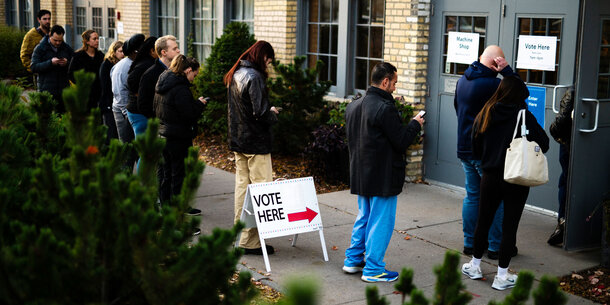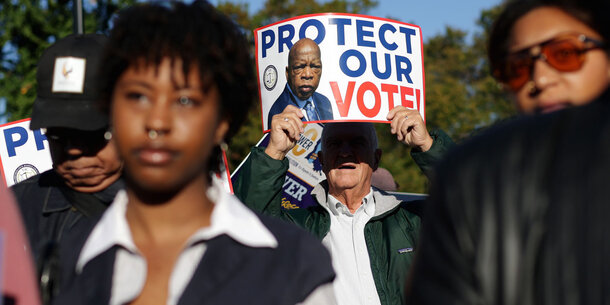Section 2 of the Voting Rights Act plays an indispensable role in protecting communities of color against racial discrimination in the electoral process by providing minority voters a legal claim to fight back in court against systemic exclusion. It is a critical safeguard against election policies and district maps that minimize or cancel out the political influence of fast-growing racial minorities. Now, in a case out of Galveston County, Texas, the Fifth Circuit Court of Appeals is considering whether to significantly limit the reach of Section 2 by categorically prohibiting minority voters of different racial backgrounds, such as the Black and Latino plaintiffs in that case, from jointly challenging discrimination that impacts more than one racial group.
Galveston County has a long history of discriminatory redistricting. On two separate occasions, in 1992 and 2012, the Department of Justice used its preclearance powers under Section 5 of the Voting Rights Act to stop Galveston County from implementing maps that diminished the ability of minority voters to elect preferred candidates. As a result, since 1992, Black and Latino voters have been able to secure representation on the county commission through a majority-minority district secured by the Voting Rights Act.
But the Supreme Court’s 2013 ruling in Shelby County v. Holder gutted Section 5 and, for the first time in decades, Galveston County was no longer subject to preclearance. Without the antidiscrimination check, the county used the 2021 redistricting process to dismantle the long-standing majority minority district. Under the plan, the county scattered Black and Latino voters across all five districts, all of which now have white majorities that systemically vote against minority-preferred candidates. Despite minorities constituting roughly one third of the county’s eligible-to-vote population, the districts effectively shut out Black and Latino voters from representation in county government. Accordingly, Black and Latino voters, local civil rights groups, and the Department of Justice filed suit soon after this map was adopted.
The plaintiffs argued that the new district map violated Section 2 of the Voting Rights Act and alleged that it was adopted with discriminatory intent. In October 2023, a federal trial court ruled in the plaintiffs’ favor, finding that the new district plan violated Section 2 for the “stark” and “egregious” extent it denied Black and Latino voters equal voting rights. On appeal, a panel of three Fifth Circuit judges upheld the ruling but urged the circuit as a whole to revisit its precedent interpreting Section 2 that allowed Black and Latino voters to sue Galveston County in a single claim. A majority of Fifth Circuit judges agreed, and the issue will be heard en banc.
On February 21, 2024, the Brennan Center, in partnership with the Asian American Legal Defense and Education Fund and Paul, Weiss, Rifkind, Wharton & Garrison LLP, filed an amicus brief in support of plaintiff-appellees ahead of the en banc hearing.
The brief argues that the text, legislative history, and purpose of Section 2 all support claims by minority voters who suffer common racial discrimination, even if they do not share a common racial identity. When Congress amended Section 2 in 1982, it used expansive language to give claims to anyone who has been denied equal rights on the basis of race, not a specific racial identity. In fact, Congress codified a framework from a 1970s Supreme Court case that involved claims by Black and Latino voters challenging electoral districts in Texas.
And for good reason — such an interpretation is necessary to address discrimination in its various manifestations. The United States has a long legacy of official policies that, de jure, distinguished the rights and opportunities available to white people on one hand and nonwhite individuals (regardless of specific identity) on the other. Over the course of history, these crude distinctions denied minorities equality not just in voting but also citizenship, schooling, housing, employment, and even marriage.
The brief also argues that the Section 2 framework which federal courts have used for decades applies equally well whether a claim is brought on behalf of a mono- or multiracial group of voters. Its rigor and fact-intensive nature means courts can distinguish between cases that have merit where voters of different backgrounds have suffered common discrimination and ones where that cannot be proven.
The Fifth Circuit will hear oral argument on May 13, 2024.
Case Documents
- Department of Justice Original Complaint (March 24, 2022)
- NAACP Original Complaint (April 14, 2022)
- Trial Court’s Findings of Fact (October 13, 2024)
- Trial Court’s Order in favor of Plaintiffs (October 13, 2024)
Three-Judge Panel
- Notice of Appeal filed by Galveston County Commissioners Court, Galveston County (October 17, 2023)
- Opposed Motion for Injunction Pending Appeal (October 17, 2023)
- Court Order granting Temporary Administrative Stay (October 18, 2023)
- Court Order setting emergency appeal for oral argument (October 19, 2023)
- Sufficient Brief of Galveston County Commissioners Court, Galveston County, Mark Henry, and Dwight D. Sullivan (October 26, 2023)
- Amicus Curiae Brief filed by Judicial Watch, Inc. (November 2, 2023)
- Brief of U.S. Department of Justice (November 2, 2023)
- Brief of Dickinson Bay Area Branch NAACP, Galveston Branch NAACP, LULAC Council 151 (November 2, 2023)
- Brief of Terry Petteway, Derrick Rose, Penny Pope, Mainland Branch NAACP (November 2, 2023)
- Amicus Curiae Brief filed by Lawyers’ Committee for Civil Rights Under Law (November 2, 2023)
- Reply Brief of Galveston County Commissioners Court, Galveston County, Texas, Mark Henry, and Dwight D. Sullivan (November 6, 2023)
- Panel Opinion (November 10, 2023)
En Banc Petition
- Motion for Hearing En Banc (November 2, 2023)
- Response/Opposition to Motion for Hearing En Banc of Terry Petteway, Derrick Rose, and Penny Pope, Mainland Branch NAACP (November 6, 2023)
- Response/Opposition to Motion for Hearing En Banc of U.S. DOJ (November 6, 2023)
- Response/Opposition to Motion for Hearing En Banc of Local Branches NAACP, LULAC Council 151 (November 6, 2023)
- Court Order Extending Administrative Stay (November 10, 2023)
- Court Order for Rehearing En Banc (November 28, 2023)
En Banc Hearing
- Motion to Stay District Court Proceedings (December 1, 2023)
- Response/Opposition to Motion to Stay District Court Proceedings of Local Branches NAACP, LULAC council 151 (December 4, 2023)
- Response/Opposition to Motion to Stay District Court Proceedings of U.S. DOJ (December 4, 2023)
- Response/Opposition to Motion to Stay District Court Proceedings of Terry Petteway, Derrick Rose, Penny Pope, Mainland Branch NAACP (December 4, 2023)
- Reply to Response/Opposition to Motion to Stay District Court Proceedings of Galveston County Commissioners Court, Galveston County (December 5, 2023)
- Opinion granting Motion to Stay District Court Proceedings (December 7, 2023)
- Supplemental Brief of Galveston County Commissioners Court, Galveston County (January 15, 2024)
- Amicus Curiae Brief filed by National Republican Redistricting Trust and Honest Elections Project (February 1, 2024)
- Amicus Curiae Brief filed by Judicial Watch, Inc. (February 1, 2024)
- Supplemental Brief of Terry Petteway, Derrick Rose, and Penny Pope (February 14, 2024)
- Supplemental Brief of Local Branches NAACP, LULAC Council 151 (February 14, 2024)
- Supplemental Brief of U.S. DOJ (February 14, 2024)
- Amicus Curiae Brief filed by the Constitutional Accountability Center (February 21, 2024)
- Amicus Curiae Brief filed by NAACP Legal Defense Fund (February 21, 2024)
- Amicus Curiae Brief filed by Lawyers’ Committee for Civil Rights (February 21, 2024)
- Amicus Curiae Brief filed by Brewer Storefront PLLC (February 21, 2024)
- Amicus Curiae Brief filed by Brennan Center for Justice and Asian American Legal Defense and Education Fund (February 21, 2024)




